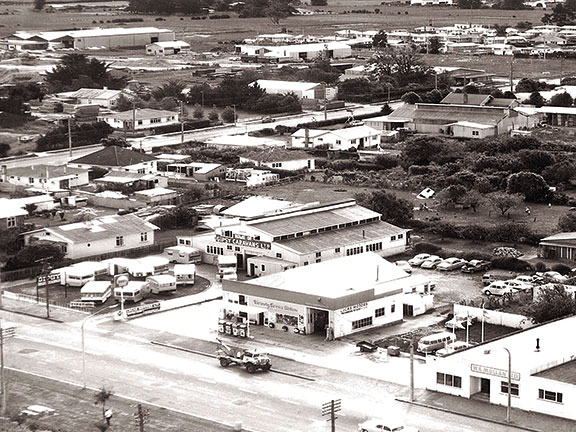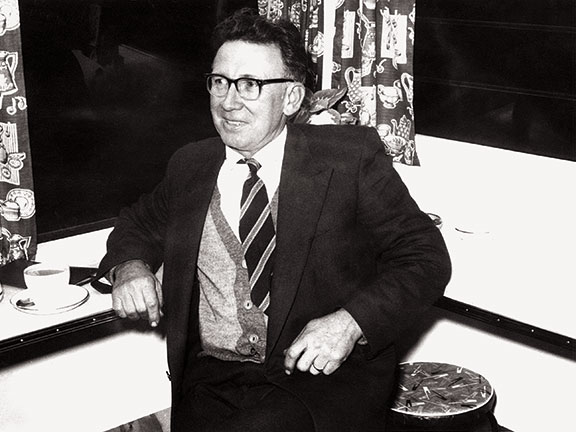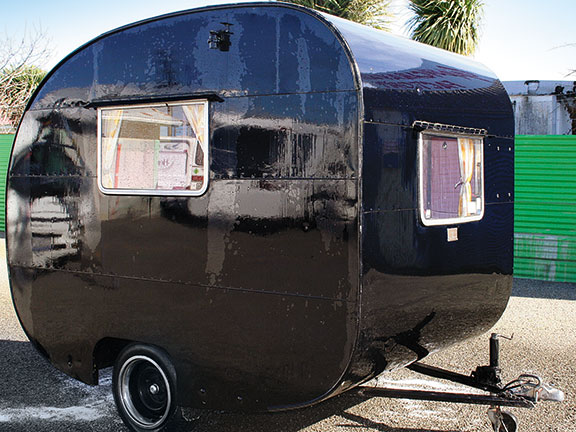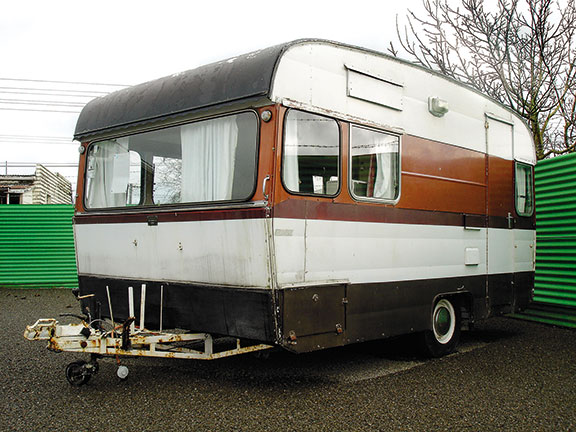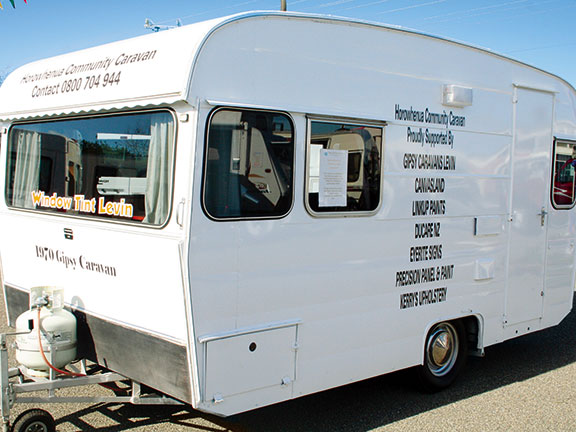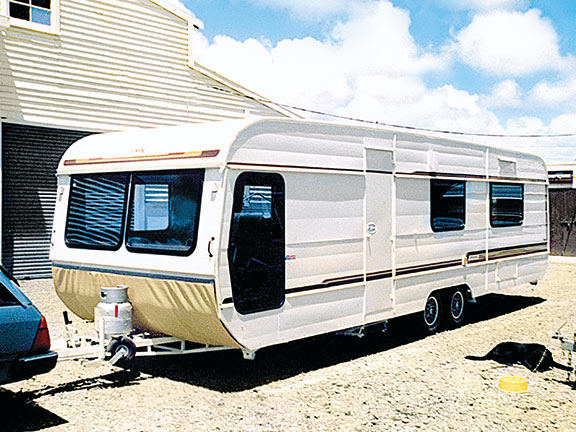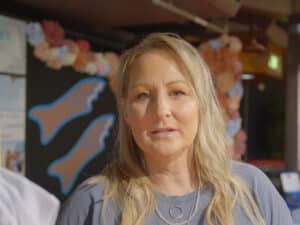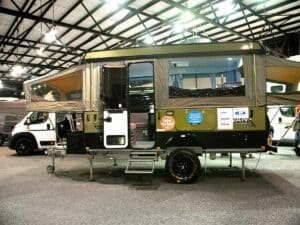When the first Gipsy Caravan rolled off the line in Levin in 1951, Robin Croot was knee-high to a grasshopper. A decade later he joined the company started by his parents Frank and Laura and a dynasty was born.
Fast forward to 2013 and Andrew Croot is sitting at the desk formerly occupied by both his father and grandfather. Also working in the family business are brother David and sister Nicola. Andrew takes us on a tour of the workshop, factory, and yard. Tucked away in a far corner is a little black beauty — a vintage 'van from Gipsy's earliest days. Over the coming months it will be restored to original condition as a flagship for the company which has survived the storms and flourished.
In the workshop is a spare-no-expense project being undertaken by a client for whom money is clearly no object. By the time it is finished, the van will sport state-of-the-art appliances and be used as a green room for movie stars on set in New Zealand. The two projects underscore the breadth of Gipsy Caravans' restoration work.
The company also repairs and rebuilds all makes and types of vehicles (motorhomes, buses, commercial vehicles, and caravans) for insurance, containment, or conversion. It has recently opened a Camec shop, and still builds or custom-builds the Gipsy Caravans around which it has forged its reputation.
Wandering around the yard we encounter the various brands Gipsy represents, as well as second-hand traded vehicles, from well-regarded New Zealand manufacturers, such as TrailLite and LeisureLine. But still there's another unusual string to Gipsy Caravan's bow: small scale rentals at very reasonable prices, mostly for Levin families keen on a getaway.
This is, after all, not just a success story for the family, but also for the community. Levin was once the uncrowned capital of New Zealand caravan manufacturing, with four companies working out of the Horowhenua township.
At the height of its operations in the early 1970s, when Robin Croot took over the role of general manager, Gipsy Caravans employed 28 people. Throughout the 60s and 70s, the sale of recreational caravans had flourished along with the family's fortunes.
But all of this was to come crashing down at the stroke of a pen in May 1978, when the government of Robert Muldoon introduced the controversial sales tax on caravans. Almost overnight the orders for all but two caravans were cancelled. In the bleak days following, all staff were given notice. Only Robin and the factory manager stayed on to complete orders. Frank returned from retirement to take over the administration from Robin who donned overalls and went back to the shop floor.
These were dark days. Frank Croot died a few years later. Robin believes stress hastened his father's death.
"I later learnt from my mother that Dad had worked all day and half the night to keep up with the workload. I think the stress killed him and several others of our former employees, who were also in the grave ahead of their time."
It took the company more than four years to recover from the sting of the tax. Along the way it incorporated Classic Caravans — the Levin company with which it had always maintained a friendly rivalry.
Robin recalls, "Dad always maintained a great relationship with the two Hurst brothers who started Classic Caravans. Initially he took their overflow work building commercial vehicles like pie carts, dental clinics, and circus accommodation and it went on from there. Both companies had their chassis made in Marton and we'd pick up three or five at a time."
Frank's initial interest in caravans can be traced back to his Australian upbringing. Every three years Frank had returned home to Sydney to visit his family. In 1951 he took the whole family, hired a caravan, and drove the return trip from Sydney to Adelaide. Back at home, he began construction of a family caravan.
"He caught the bug," says Robin.
Frank started construction in October and the 'van was ready for the family's Christmas holidays that year, at Opal Springs, near the Waikato town of Matamata.
Robin was keen to learn the trade and remembers walking home from school to the fac.tory, where he could be found watching and learning from the age of eight.
"My father was an excellent teacher. I learnt a great deal from him," says Robin.
Robin joined the family company fresh from school and has since been involved in all aspects of the business, from driving trucks to manufacturing.
Business built slowly throughout the 50s and was particularly brisk throughout the 1960s and 70s. Initially, the most popular models were 'vans between 10 foot and 14 foot. However, at its peak the company was completing one 25-foot caravan a week.
Looking back, Robin is philosophical about the dark days that followed. "In some ways I think Muldoon did us a favour. After that, Dad was always on to me to pull my horns in and to resist allowing the business to get any bigger."
Now 70, Robin is meant to be retired. He's working on a couple of personal projects and can be found at Gipsy's yard most days.
"It began as a hobby and it's still a hobby. I've been very fortunate to work in a business that keeps me always in the holiday mode."
For the latest reviews, subscribe to our Motorhomes, Caravans & Destinations magazine here.
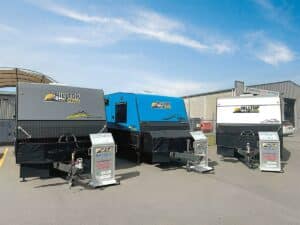
Behind the brand: Rolleston Caravans
When Lucy and Sergey Shushin imported their first UK caravan some 11 years ago for their personal use, they had no idea they were embarking on the first step of their future business.

